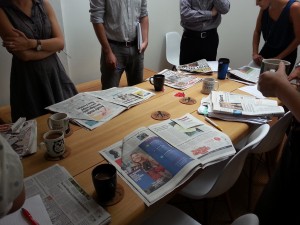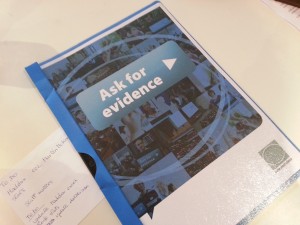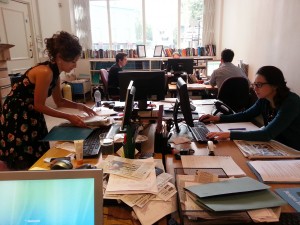The second week at Sense About Science has been packed with old and new things. I feel I am learning a lot and getting more involved in the office actvitities, which is a great feeling.
The day starts always with the news: the entire office team gathers and skims the newspapers looking for articles reporting science-related stories. The purpose is to check if these accounts are reliable, if the science is reported in an accurate way, if the claims made are actually evidence-supported or not.

If they sound unclear or dubious the team discusses about the opportunity of asking the newspaper or the person who made a statement for some science-based evidence.
There was an ad reported some days ago about a pair of gloves containing golden nanoparticles which are supposed to help your skin look younger. I looked at the company website, in particular at their “the Science” page, but the information (and the graphs) I found there were quite confusing and not really explanatory, so we decided to write an email to the company asking for clarifications. Nothing happened for one week. The following Monday on the Sense About Science twitter account (@senseaboutsci) we mentioned the ad and the fact that I had been asking for evidence and… half an hour later I received an email! I was quite impressed, I admit. The pressure of social media does work! Companies must feel accountable for what they claim, and this seems to be a good way to achieve that.

Besides the Ask for Evidence campaign, I have been collaborating on a couple of other projects Sense About Science is working on. One of them is the Maddox Prize, a recognition to scientists who are committed to bring evidence-supported science into the public debate, despite hostility. This year Sense About Science received more than 50 nominations: a tough job for the evaluating commitee!
I have also been working on a power point presentation about Statistics. This is part of a series of short guides called, “Making Sense of” which summarize useful tips we should keep in mind when reading news about science. One of the guides already published, for example, is called “Making Sense of Chemical Stories” and helps the reader understand why and when we should (or not) be concerned about chemicals. My work was to distill some basic guidelines to navigate in the complex world of statistics. I didn’t realise how often statistics was used in the news, I developed a very selective eye in spotting weird claims now.
The key word if you are working for an organization like a (relatively) small charity is Multitasking. One thing is granted: you will not get bored. There are many activities going on at the same time, and a lot to do to keep them going. Good planning skills are definitely needed!

I am now half-way through my internship. I find myself looking forward to the next week and all the work ahead. Let see what the press is cooking up for us tomorrow…